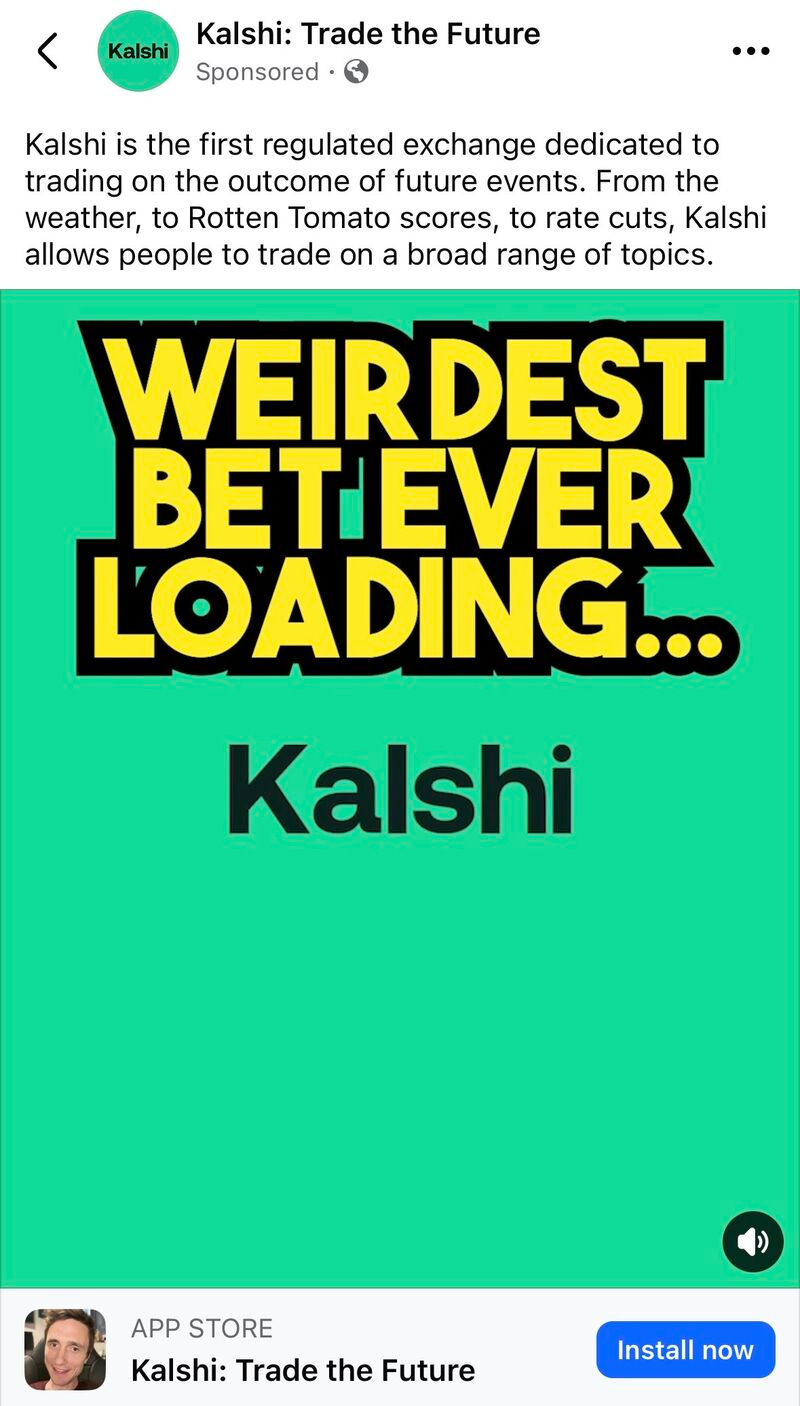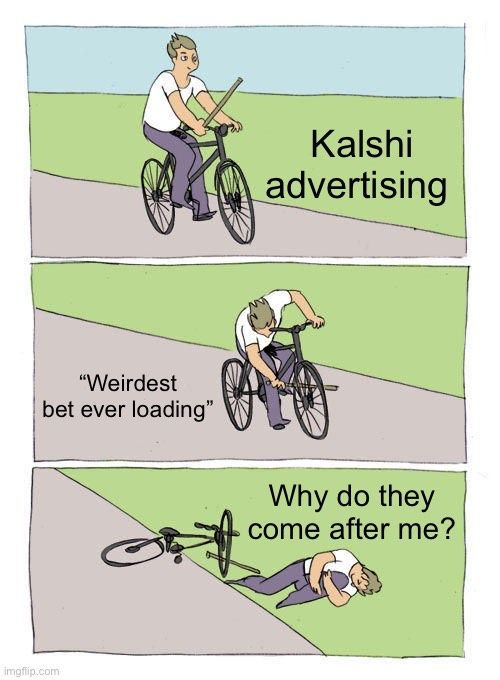The Closing Bell: Genius Sports Supports CFTC Regulation Of Sports Betting
Data company penned a letter to the CFTC. Prediction markets roundup: NFL single-game betting launches; a candidate bet on himself to win an election; CFTC pick to cut ties with Kalshi.
The Closing Bell is a roundup of prediction markets news, analysis and other thoughts each Friday.
Data company Genius Sports has weighed in with the Commodity Futures Trading Commission, offering support for the future of sports event contracts at prediction markets.
“We are confident that a Federal regulatory approach to sports markets, led by the CFTC, can foster continued growth and innovation within sports event contracts in a responsible way,” wrote Tom Russell, chief legal officer for Genius, in the letter.
Genius points to current state-level protections and emphasized “data integrity” as key points for the CFTC to consider moving forward:
“We believe that it is critical — as DCM-offered sports event contract markets grow — for the CFTC to consider and evaluate the protections unique to the state-based sports markets regulatory regimes, especially protections around sports integrity. Ensuring data integrity and the integrity of the underlying sporting events is essential to validating and being able to conclude that a sports event contract is not readily susceptible to manipulation.”
Whether the CFTC can become an effective regulator for sports betting/sports event contracts — or if it even wants to do more than it is doing now — remains an open question.
Here are some excerpts from the Genius Sports letter:
“We recognize sports event contracts traded on CFTC-registered DCMs as an area of significant potential growth and innovation. Further, as experienced stakeholders in regulated sports betting markets, we deeply understand the importance of structuring sports-related products around clarity, consistency, and integrity for the offerors of such products, services providers, and end-users. …
Through our official partnerships with various sports leagues and platforms, as well as significant investments in upholding integrity and safeguarding our product offerings, Genius Sports has seen first-hand the benefits to the sports and sports markets industry of a framework that fosters these principles. As previewed above, we also recognize that CFTC-registered DCMs and the brokers bringing traders to those venues are subject to many of the same standards and principles as state regulated sports markets venues, including robust KYC/AML obligations, market surveillance programs, information sharing programs with underlying marketplaces, contract integrity, customer protection requirements, and customer disclosure obligations. Market surveillance is of particular importance because a DCM must ensure that its contracts are not readily susceptible to manipulation. We believe that it is critical — as DCM-offered sports event contract markets grow — for the CFTC to consider and evaluate the protections unique to the state-based sports markets regulatory regimes, especially protections around sports integrity. Ensuring data integrity and the integrity of the underlying sporting events is essential to validating and being able to conclude that a sports event contract is not readily susceptible to manipulation.
Genius Sports has watched with interest as DCM-offered sports event contracts continue to proliferate and as courts and various regulators continue navigating a range of jurisdictional issues. Without attempting to solve in this letter the jurisdictional considerations underway, we do believe that it is practical to observe that the sports gaming taking place on state-licensed sports markets (traditionally referred to as sports betting) is (in many respects) equivalent to DCM-listed sports event contracts. Following from that straightforward observation, we also believe that solving for risks related to data and sports integrity is a critical component to address for CFTC / DCM-listed contracts. In parallel, we agree with concerns already put forward by sports organizations to the CFTC that these risks will increase exponentially if and when in-play and player proposition or other individual performance-based markets are offered on DCMs as sports event contracts in due course.
We are confident that a Federal regulatory approach to sports markets, led by the CFTC, can foster continued growth and innovation within sports event contracts in a responsible way, and we want to support the next steps by offering and sharing our learned experiences and expertise with the agency. The CFTC should take advantage of the opportunity to leverage and incorporate the unique features embedded within the state-based sports markets regulatory regimes, particularly those related to customer protection and sports integrity, to ensure that these contracts are not readily susceptible to manipulation.”
You can read the whole thing here:
The rest of the roundup:
California Candidate For Governor Bets On Himself To Win (The Event Horizon): “Kyle Langford, a Republican candidate for governor in California, bet on himself to win the highest office in the state at Kalshi this weekend.
Langford posted a video of himself placing the wager on Twitter/X on Saturday: ‘I just bet $100 that I, Kyle Langford will be the next Governor of California, join me (if you believe) @Kalshi’”
What Are The Guardrails For Election Betting? (The Closing Line, podcast): “An incident at Kalshi where a candidate for governor in California bet on himself has me asking a lot of questions… to myself, in podcast form.”
This feels like a bigger story than it has been to this point, from questions on Kalshi’s prohibitions on election trading to the possibility of candidates trying to use Kalshi to manipulate odds. If this same set of circumstances had happened in sports or in a higher-profile political market, pitchforks would be out everywhere.
Two MIT Math Nerds Crack Open Legalized Gambling on Wall Street (Bloomberg, paywall): Most interesting thing I saw in here: “The startup says sports parlays — a combination of bets — and wagers on in-game player performance are not on its roadmap.” If that’s really the case, that starts to set a ceiling on things at Kalshi. If all of this continues to expand in sports, though, someone is going to push into a parlay-like product, whether it’s Kalshi or someone else.
I presume this Bloomberg piece on Kalshi won’t be retracted?
In other mainstream coverage this week:
CFTC Pick Quintenz To Resign From Kalshi Board And Divest Stock Upon Confirmation (Event Horizon): “Brian Quintenz, the nominee to chair the Commodity Futures Trading Commission, divulged his plans for his relationship with Kalshi in his ethics agreement that came out this week.”
Quintenz might be the only commissioner at the CFTC if/when he is confirmed, with every current commissioner either out or on their way out. It’s hard to see everything going on at the top level of the commission and think this is anything but good for Kalshi.
The Kalshi Policy Dinner in Las Vegas: Kalshi CEO Tarek Mansour was hanging out with Tom Emmer, the majority whip in the House.
This week in Kalshi marketing itself as gambling: I am going to include these two images, you can read my LinkedIn post in full if you want:
I thought this was funny from Mansour on LI, kind of illustrating the above point: “Note: before the press goes crazy, I disagree with the ‘gambling’ characterization, which is often used to unfairly describe financial markets.” Your marketing team calls it gambling all the time, and has been for months!
Five Interesting Things Kalshi CEO Tarek Mansour Said At Solana Accelerate (Event Horizon): Here’s what Mansour said at one point: ‘I think within the next year and a half I would say most mainstream financial brokerages like where you have your 401(k)s and others will have access to Kalshi’s products or prediction markets in app. … but this adoption of prediction markets and the places where people keep their money and go to to sort of check their balances and their paychecks and so on and so forth, and I think that's a critical step for us, and the results this year have been showing the growth has been really really astronomical.”
I’ve been a broken record on this, but there’s no great argument that we should start seeing sports betting on financial platforms where people have their retirement accounts and do their banking. It’s a recipe for disaster.
Kalshi has a CFO (LinkedIn): Rebecca Schick made the announcement of taking on the role on LI. She previously held the same role at Sunrise Futures LLC. “I’m so excited to announce that as of last week, I have officially joined the team at Kalshi as their new CFO for Kalshi Klear. If you don’t know about Kalshi - let’s talk! They are the only federally regulated prediction exchange. 🔮 The best word to describe this move thus far is “electrifying”. Throughout my career, I have always stood by one of my main goals - to help build something. I cannot wait to see what we will build together at Kalshi! ***My team is also hiring so if you want to be a part of the future of financial markets - let’s connect, let’s chat but most importantly LFG!***”
Betting on Chaos (Risk of Ruin podcast): “Domer is a prediction market trader, and is one of the biggest bettors on Polymarket. He talks about his journey from Intrade, to Predictit, to Polymarket. He also talks about the 2024 election, which was a rollercoaster. It featured highs - like backing Kamala Harris before President Joe Biden had even dropped out of the race - and also lows, like being short Trump on election night. Domer also talks about unraveling the mystery of the so-called French Whale.”
Frivolous, Recreational or Essential? The CFTC's Missed Opportunity (Full Court Press, partial paywall): “Last week, we continued our coverage of the Kalshi v. CFTC case. We explained how The Court of Appeals for the D.C. Circuit saw through the ambiguity but the CFTC missed its moment. This begs the question: Why? Not all that long ago, the CFTC had already argued along similar lines of what the Court of Appeals was suggesting: gaming means gambling and economic purpose matters. When rejecting Nadex’s political event contracts in 2012, the CFTC was firm and did not mince words.”
Kalshi Will Have Betting On NFL Games This Season (The Closing Line): “Kalshi will have single-game betting on the NFL this fall in 50 states, as the prediction market platform posted Week 1 games on Thursday. The news is not shocking, given that Kalshi had already rolled out single-game betting — the equivalent of moneyline betting at sportsbooks — for the other major North American sports leagues (NBA, NHL, Major League Baseball).”
Will the NFL (and the NCAA) awake from their slumber and address this issue head-on or not?
More Than 80% Of Kalshi Trading Volume Was On Sports Last Week (Event Horizon): More than 80% of contracts traded at Kalshi involved sports last week, with that percentage rising to more than 90% over the weekend.
Kalshi did not accurately predict the outcome on China tariffs: President Trump ending the tariffs before June was at 1% as recently as the day before the market closed.
It was also not a source of truth for Elon Musk leaving the Department of Government Efficiency. He only had a 20% chance of leaving before June 16 as of a couple of days ago:
Ridiculous things you can
bettrade on at prediction markets:Polymarket edition: “Will Zelenskyy wear a suit before July?”
Update on a past entry here, Polymarket still has a 13% chance that Jesus returns before GTA VI is released.
Kalshi edition: “What will Ross Ulbricht say at Bitcoin2025 Conference?” These mention markets have to be among the most degen things you can bet on in the world. You could bet on whether or not he would say “freedom,” for instance. Huge impacts in the real world if he said “freedom” or not (written in sarcasm font).
For more analysis on prediction markets, check out Adjacent Press:











